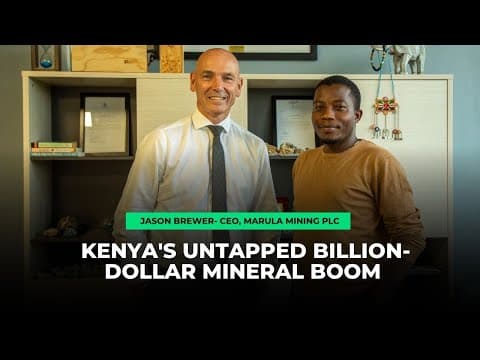Kenya is rapidly positioning itself as a vital player in the global electric vehicle (EV) revolution, leveraging its rich, yet largely untapped, mineral resources.
In an interview with The Kenyan Wall Street, Jason Brewer, a seasoned mining engineer and CEO of Marula Mining Plc, says Kenya has unparalleled advantages in becoming Africa’s hub for the battery metals sector.
- •Clean Energy: Over 90% of Kenya’s energy is derived from renewables, a distinction few countries globally, and no other in Africa, can claim. This clean energy supply is crucial for sustainable processing and value addition in the mineral sector.
- •Robust Infrastructure: Kenya boasts some of Africa’s best ports, offering significant logistical benefits. For instance, Mombasa port is half the distance to the Middle East compared to South African ports, drastically cutting costs.
- •Educated Workforce: The country possesses a highly educated and hardworking workforce, which Brewer considers a key natural resource, akin to Singapore’s human capital.
Historically, Africa has suffered from a “commodities curse,” exporting raw products with value addition occurring elsewhere. Jason says Marula Mining is dedicated to reversing this trend by focusing on in-country refining and processing, aiming to transform raw materials into battery-grade products.
Marula Mining’s Key Operations in Kenya
Marula Mining’s primary focus in Kenya is on copper, graphite, and manganese, all critical minerals for new economies and the transition to green energy.
- •Manganese: Marula is rapidly advancing two manganese projects in Kenya, in Samburu and particularly in Kilifi. The Kilifi project’s proximity (60 km) to the Port of Mombasa makes logistics highly efficient. While manganese has been traditionally mined by artisanal miners, Marula is scaling up to a large-scale operation, targeting 25,000 to 100,000 tons per month. Significantly, Marula has secured a five-year agreement with Bow Steel, the world’s largest steel manufacturer and a major consumer of manganese. He says exports to China, the Middle East, and India are anticipated to commence soon.
- •Graphite: Graphite is a critical component of EV batteries, and mining and processing are expected to accelerate in the latter half of this year. Historically, Kenyan graphite operations were known for superior grade and quality compared to Mozambique, a major African producer. There’s also an opportunity to process graphite currently considered a waste product from gemstone mining around Voi.
- •Copper: While Marula operates a copper mine in Tanzania, copper mineralization extends into Kenya, with deposits being as high in quality as those already being mined, processed, and sold from Tanzania.
- •Lithium: Recognizing the immense interest from tech giants like Apple and Tesla, Marula is actively exploring earlier-stage lithium projects identified in Kenya. Brewer notes that these commodities are “far easier to extract than in some of our neighboring countries… like the DRC which clearly has a higher risk profile than Kenya”.
Regulatory, Nairobi Securities Exchange Listing
Brewer describes a largely positive and receptive regulatory environment, noting that the current Kenyan government is keen to attract investment and maximize the value of its resources.
Marula Mining plans a dual listing on the Nairobi Securities Exchange (NSE), in addition to its existing listings in London and South Africa. This strategic move has been a long process, waiting for Marula to transition from a growth stock focused on exploration to a steady-state producer with production and cash flow from multiple operations. This shift, expected this year, aims to appeal to Kenya’s more conservative financial institutions and investors.
RELATED;
SKL Debuts on Nairobi Bourse at KSh 5.90, Eyes Expansion in Packaging Sector

